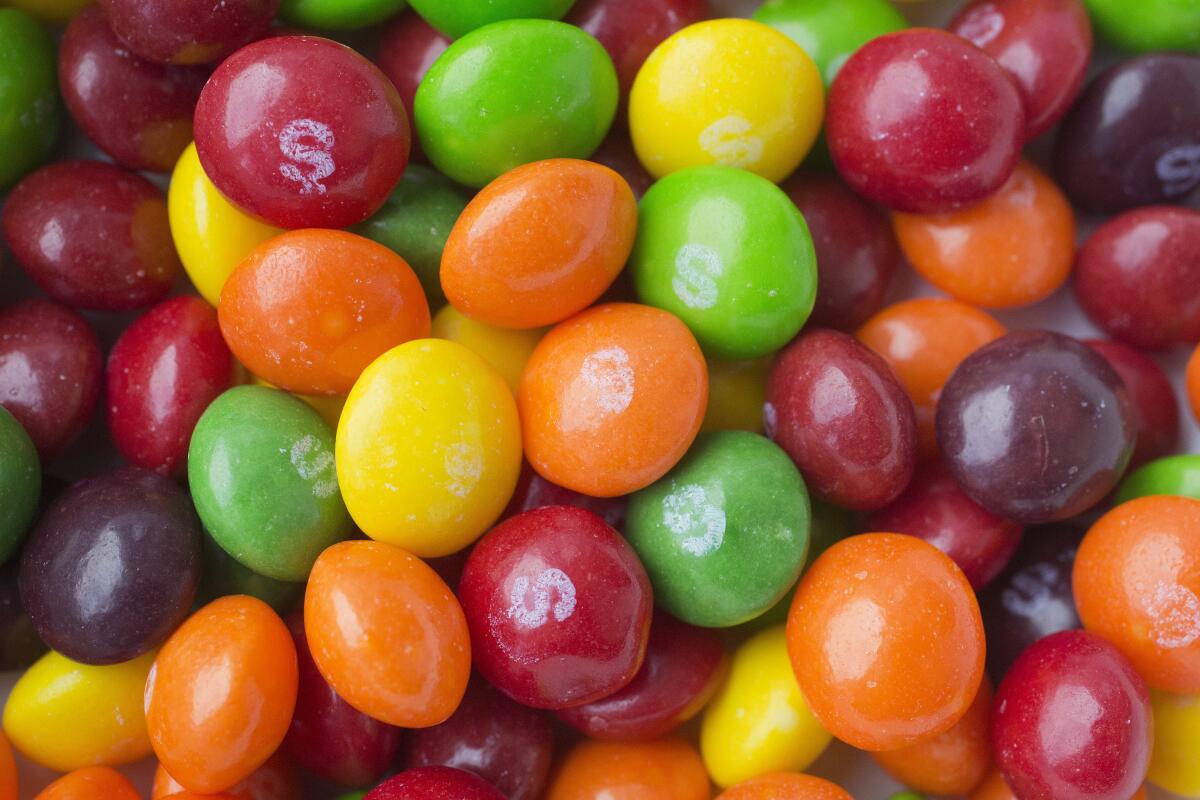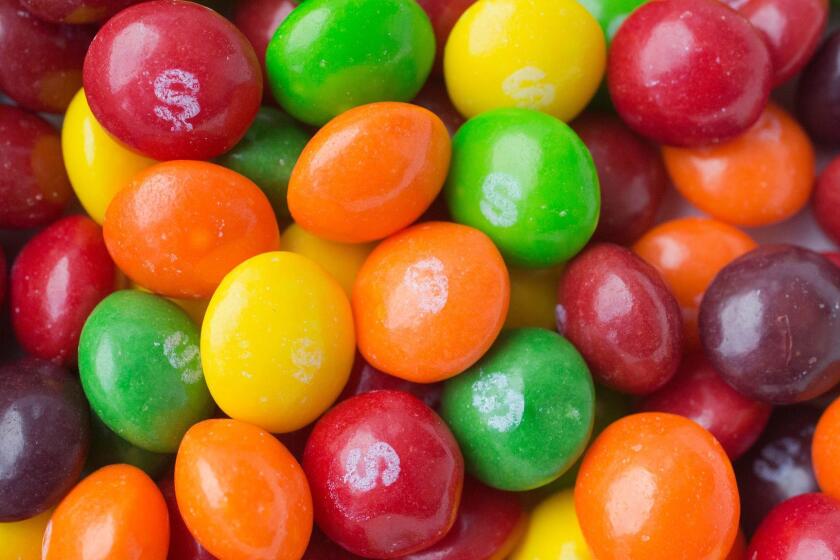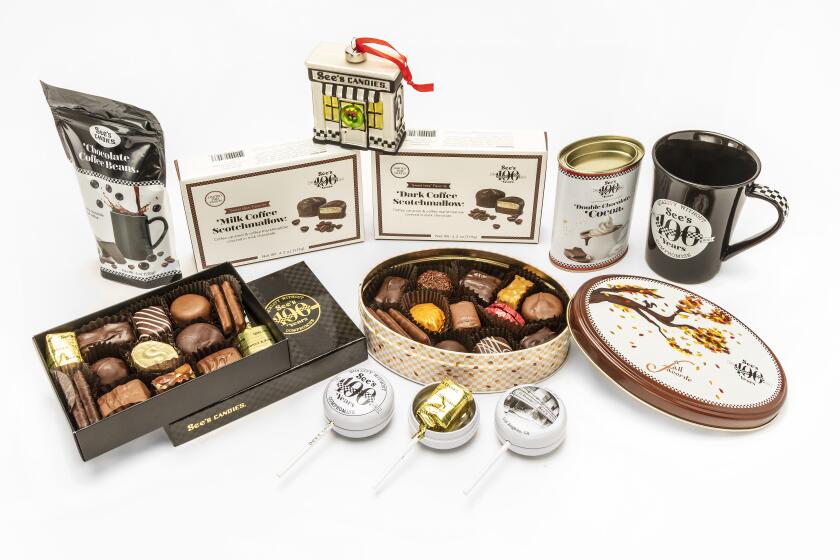Skittles ‘unfit for human consumption,’ California lawsuit claims

- Share via
Skittles, the colorful, fruit-flavored candy, are coming under fire after a lawsuit filed in Northern California says people are tasting more than the rainbow.
Although most people can identify Skittles flavors like lemon, strawberry and orange, few can probably name titanium dioxide, a coloring additive that helps give the candies their bright hue.
That ingredient is a “known toxin” and “unfit for human consumption,” according to a lawsuit filed last week against the Mars candy company in the Northern District of California. It argues that U.S. consumers are not aware of the health risks associated with the artificial food coloring.
Titanium dioxide — or TiO2 — is listed as an active ingredient in Skittles sold in the United States, although it has been removed from the candy’s recipe in several European nations and banned in several other countries, according to the lawsuit.
A mysterious Skittles spill on a rural highway in Wisconsin is taking another twist, with Mars Inc. saying it doesn’t know why the discarded candy might have been headed to become cattle feed.
In 2016, Mars Inc. promised to phase out titanium dioxide and said that artificial colors like TiO2 “pose no known risks to human health or safety.”
Around the same time, the European Food Safety Authority said there was uncertainty about the characterization of the ingredient. But in May 2021, the EFSA concluded there was enough research to indicate that titanium dioxide was no longer safe when used as a food additive.
The group said TiO2 particles posed concern for genotoxicity, meaning a substance that has the ability to damage a person’s DNA and may cause cancer. The EFSA said that after the ingredient is taken by mouth, the absorption of titanium dioxide particles was low but could accumulate in the body.
The lawsuit filed Thursday by San Leandro, Calif., resident Jenile Thames is seeking to turn the complaint into a class action lawsuit against the Mars candy company.
Mars Inc. did not immediately respond to an email from The Times seeking comment over the allegations, but in a statement to the “Today” show, the candy maker said: “While we do not comment on pending litigation, our use of titanium dioxide complies with FDA regulations.”
Here’s what we know:
Are Skittles safe to eat?
The insanely colorful advertising behind the candies implores consumers to “Taste the Rainbow.” But it doesn’t get into the fine print on food additives.
Titanium dioxide was approved for human consumption by the U.S. Food and Drug Administration in 1966. It’s used in a variety of foods, including baked goods, sandwich spreads and salad dressing.
The FDA says the ingredient is not to exceed 1% by weight of the food when used as an ingredient, and as of March 29, the agency maintains that titanium dioxide is safe as a food colorant.
Read our full coverage of See’s Candies and its 100 years.
However, the European Food Safety Authority has a different take on TiO2. In May 2021, its experts could “no longer consider titanium dioxide safe when used as a food additive.”
The agency said the general toxic effects of the ingredient were not conclusive, but it could not rule out the harmful effects of the food coloring and “could not establish a safe level for daily intake of TiO2 as a food additive.” The European Commission will ban titanium dioxide, also known as E171, by the end of the year.
Could Skittles be made without titanium dioxide?
The concept of food additives includes preservatives that slow product spoilage as well as vitamins and spices. Color additives include dyes, pigments and other substances added to food, drugs or cosmetics, according to the FDA.
Titanium dioxide is used to give Skittles their bright colors, but there are other products on the market that don’t use the ingredient, court records show.
“Numerous of defendant’s competitors do not use TiO2 in their products and yet are able to maintain the colorful impression defendant hopes to achieve with its products,” the lawsuit states.
Among the colorful candies the suit names that do not use titanium dioxide are bright-red Swedish Fish Soft & Chewy Candy, Black Forest Gummy Bears and Sour Patch Kids. Even M&Ms, which are also sold by Mars Inc., do not use titanium dioxide, the lawsuit says.
Tatiana Santos, chemicals manager with the European Environmental Bureau, a network of citizens’ advisory groups, told the Guardian that the U.S. has a “wait and see” approach when it comes to regulation over food ingredients.
“The U.S. often waits until the harm is done, and the EU tries to prevent it to a certain extent,” Santos told the Guardian. “It often seems the U.S. favors the market over protection.”
More to Read
Sign up for Essential California
The most important California stories and recommendations in your inbox every morning.
You may occasionally receive promotional content from the Los Angeles Times.













